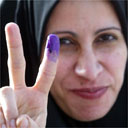The United States is approaching thirty years of direct and tumultuous involvement in the dangerous and tortuous politics of the Arab World. President Reagan’s catastrophic 1982 decision to directly engage US Marines in force separation and peace keeping activities in attempting to bring a ceasefire in Lebanon’s murderous Christian Muslim civil war resulted in the largest single day loss of American service men since Iwo Jima in World War II, with 241 American and 58 French peacekeepers losing their lives to a terrorist attack in Beirut October 23rd, 1983. The devastating nature of that attack and America’s quick withdrawal left America and Europe adverse to the direct involvement in middle east affairs and an impression in the radical Arab community that western forces were paper tigers that could not withstand loss. Progressively since that event, persistent testing of western resolve has been the rule, with violent and cataclysmic contacts being the norm – Iraq’s invasion of Kuwait by Saddam Hussein in 1991 and resultant need for the Desert Storm expulsion, the World Trade Center Bombing in 1993, the Khobar Towers bombing in Saudi Arabia in 1996, the American embassy bombings in Tanzania and Kenya killing hundreds in 1998, the USS Cole terrorist attack in 2000, and the penultimate terrorist attack on the World Trade Center, Pentagon, and Flight 93 foiled destruction on the US Capital building on September 11, 2001. This succession of blows led to the extensive and sustained efforts of the United States to actively change the accepted paradigm by invading Iraq and Afghanistan, and attempting to convert despotic processes into a democratic model not previously seen in the Arab world.
Of particular focus and requiring massive expenditure in lives and resources has been the country of Iraq, a generally modern and one time prosperous country in the fertile crescent of the Tigris and Euphrates rivers, and lying on top of the third largest known oil deposit in the world. Iraq lies on the knife’s edge of Muslim history, split between the Sunni royal dynasties of the Near East and the Shia theocracy of Iran and Pakistan. Ruled for thirty years by the fasciistic dictator Saddam Hussein, its people remained buried beneath a tyrant’s whim and suffered greatly in spasmodic wars, government perpetrated rapes and murders, ethnic cleansing, and even internal use of chemical weapons against Iraq’s own populus. The United States’ extremely risky strategy was to overthrow the dictator and help the Iraqis produce a form of self government known nowhere else in the Arab world. The ideal was a society that would inspire others in the region to begin to focus on their people’s welfare and less on the perceived slights of a western world the radicals were convinced had purposefully left them so far behind. This experiment in human freedom and self determination has demanded enormous sacrifice and a logical questioning by a tired nation as to whether the sacrifice could possibly be worth it, or the Iraqi people sufficiently worthy or capable of recognizing and taking advantage of the opportunity.
The answer has been laid out since 2003 by two Iraqi brothers named Omar and Mohammed Fadhil. From the tumultuous moments of the fall of Hussein and his subsequent capture,through the horrendous summer days of 130 degrees with no public services for water, electricity, and sewage, to being eye- witnesses to the massive bombing and murder campaigns against Iraqis by warlord mullah armies and radical Al Qaida terrorists, through the aborted hopes of the first Iraqi elections ever, to the too slow too bumbling process of building viable Iraqi governmental institutions, the brothers have maintained a terrific “you are there” reporters’ eye and fundamental belief and optimism in the Iraqi character faithfully reported on their Baghdad blog IRAQ THE MODEL . The archived history from 2003, 2005, and 2006 are particularly riveting and inspiring. When all else struggled to see the faint shadows of change, the brothers using their keen eye and fundamental knowledge of the Iraqi psyche kept their poise and perceptiveness of the underlying currents for epic change. At a time when reporters hunkered down in the Baghdad Green Zone reported societal collapse, the brothers and other brave blogadiers ventured out into society to report the world as it was, both faults and hopes. A non-synthesized projection of the truth began to be heard that inspired amateur observers the world over and have changed the world’s sources for information in difficult and censored zones forever.
This all leads to the current interpretation by the world’s assembled media of the continuing “debacle” in Iraq, as five months after a close national election the Iraq government has not settled on a leader. This is thrown out as another example of the “failed” democratic experiment in Iraq, and the need for US forces to abandon their presence in Iraq before they are drawn into the inevitable and unavoidable instability in the Iraqi self governance. The brothers Fadhil beg to differ, and as they have been right so many times, it is appropriate to listen when they suggest, finally, something truly wonderful is happening in Iraq. . Omar offers in a recent post perhaps the most prescient description of what worked in Iraq, and what needs to happen in Afghanistan, if similar success is one day to be found – defeat the irreconcilable, and offer the reconcilable a chance to find political solutions. Maybe the brothers are on to something, and maybe, just maybe, if the world listens to its independent voices, the path to achieving something wonderful.
